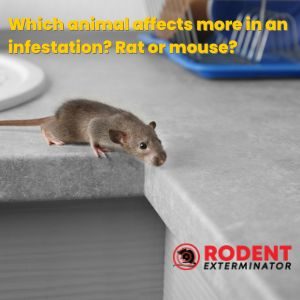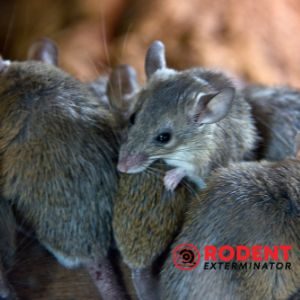Rats and mice can both be problematic when it comes to pests in your home or office.
They are both known to spread diseases and contaminate food, but which animal is more likely to cause an infestation? Weigh the pros and cons of rats and mice to see which one is the greater threat!
A rat is generally larger than a mouse and can cause more damage, as well as contaminate our food and spread diseases.
But a mouse can also transmit harmful diseases, so it’s important to take precautions against both of these pests.
What are rats and mice, and what do they look like?
Rats and mice are two of the most common types of rodents. They are both known to spread diseases and contaminate food.
-
Rats
Rats are typically larger than mice, with a longer body and tail. They have coarse fur that can be brown, black, or shades of gray, and they have small eyes and ears.
-
Mice
Mice are typically smaller than rats, with a shorter body and tail. They have fine fur that can be any color, including black, brown, gray, white, or red, and they have large eyes and ears.
What are the differences between rats and mice?
Rats and mice are both pests that can invade our homes, but there are some key differences between these two animals:
- Rats are generally larger than mice, and they can cause more damage as they search for food and nesting materials.
- Rats also contaminate our food supplies with their urine and feces, and they can spread dangerous diseases like bubonic plague and rat-borne hepatitis.
- Mice are also a potential threat to our health, as they can transmit harmful diseases like the hantavirus.
- Mice are also faster runners than rats, so you might hear them scurrying around your house at night.
It’s important to take precautions against both rats and mice in order to protect your home and family from these pests.
How do rats and mice spread disease and contaminate food?
Rats and mice can both spread disease and contaminate food. They both have the potential to cause serious health problems, and they can both make your home or office a less pleasant place to be.
Rats can spread disease through their droppings, urine, and saliva. They can also transmit disease through their bites. Rats are known to carry diseases such as salmonella, leptospirosis, and plague.
Mice can spread disease through their droppings, urine, and saliva. They can also transmit disease through their bites. Mice are known to carry diseases such as salmonella and leptospirosis.
Which animal is more likely to cause an infestation? rats or mice?
Both rats and mice can cause an infestation, but rats are more likely to do so.
Mice are smaller and can fit into smaller spaces, so they are more likely to get into food stores or other areas where they can cause damage or spread disease.
Rats are larger and have a longer lifespan, which means they can produce more offspring.
They are also better at surviving in harsh conditions, so they can spread their infestations more easily.
Ultimately, it is important to be aware of the risks posed by both rats and mice, and take steps to prevent them from becoming a problem in your home or office.
Which animal damages the house the most? Rat or mouse?
Both rats and mice can be a nuisance when they invade our homes, but which of these animals is more likely to cause damage? Rats are generally larger than mice, and they can chew through wires, insulation, and other materials in order to get into your home.
Rats also contaminate our food supplies and spread dangerous diseases.
Mice are also a potential threat to our health, as they can transmit harmful diseases like the hantavirus.
It’s important to take precautions against both rats and mice in order to protect your home and family from these pests.
Make sure you keep your home clean and free of clutter, and seal any openings where rodents could enter.
What should you do if you have a rat or mouse infestation in your home or office?
If you have a rat or mouse infestation in your home or office, it is important to take steps to address the problem. Here are some tips:
- If you see rats or mice, call a professional pest control company to help get rid of them.
- Make sure that food is properly sealed and stored, and that there is no food left out in open containers.
- Clean up any droppings or urine immediately.
- Keep your home or office clean and organized.
- If you have pets, keep them away from areas where rats or mice may be present.
- If you have children, make sure they are aware of the dangers of rats.
How to avoid a rat or mouse infestation?
There are a few things you can do to avoid a rat or mouse infestation in your home:
- Make sure your home is clean and free of clutter.
- You should also seal any openings where rodents could enter your home, such as cracks in the walls or around the doors and windows.
- Keep food sealed, clean up after yourself, and don’t leave water or food unattended on counters or in sinks where pests can find it.
- You can also use traps or deterrents to keep rats and mice from entering your home.
- If you have pets, be sure to keep their food bowls clean and free of scraps
In conclusion, both rats and mice can spread disease and contaminate food, but which animal is more likely to cause an infestation? The answer may depend on your specific situation.
If you are in an area where rats are common, then rats may be the greater threat. If you are in an area where mice are common, then mice may be the greater threat.
Ultimately, it is important to be aware of the risks posed by both rats and mice, and take steps to prevent them from becoming a problem in your home or office.
Rodent Exterminator can provide you with the best professionals and specialized services. After we finish our operation, we promise that your home will be rodent-free. Please contact us at 213-431-0890.
